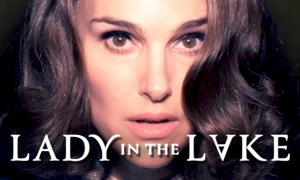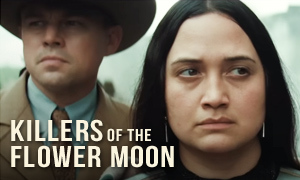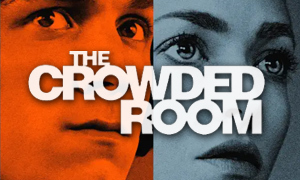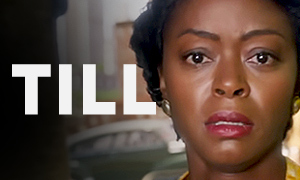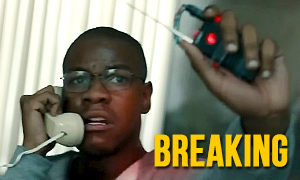Richard Jewell: History vs. Hollywood
| REEL FACE: | REAL FACE: |
Paul Walter Hauser
Born: October 15, 1986 Birthplace: Grand Rapids, Michigan, USA | Richard Jewell
Born: December 17, 1962 Birthplace: Danville, Georgia, USA Death: August 29, 2007, Woodbury, Georgia, USA (complications from diabetes) |
Sam Rockwell
Born: November 5, 1968 Birthplace: Daly City, California, USA | Watson Bryant
Born: July 15, 1951 |
Kathy Bates
Born: June 28, 1948 Birthplace: Memphis, Tennessee, USA | Bobi Jewell
|
Olivia Wilde
Born: March 10, 1984 Birthplace: New York City, New York, USA | Kathy Scruggs
Born: September 26, 1958 Birthplace: Athens, Georgia, USA Death: September 2, 2001, Atlanta, Georgia, USA (drug overdose) |
Nina Arianda
Born: September 18, 1984 Birthplace: New York City, New York, USA | Nadya Light
Born: July 25, 1961 Birthplace: Russia Watson Bryant's Secretary and Future Wife |
Eric Mendenhall
| Eric Rudolph
Born: September 19, 1966 Birthplace: Merritt Island, Florida, USA Olympic Park Bomber |
Was Richard Jewell really suffering through a bout of diarrhea when he discovered the backpack with the bomb?
Yes. As strange as this sounds, the Richard Jewell true story confirms that it is accurate. His tummy trouble comes straight from Marie Brenner's 1997 Vanity Fair profile of Richard Jewell, titled "American Nightmare: The Ballad of Richard Jewell". The article is included in her book Richard Jewell: And Other Tales of Heroes, Scoundrels, and Renegades. He was convinced it was from a bad hamburger he had eaten the day before.
Did Richard Jewell live with his mother?
In answering the question, "How accurate is Richard Jewell?" we learned that at the time of the Atlanta Summer Olympics bombing in 1996, he was indeed living with his mother, Bobi Jewell. After having previously resigned from his job as a campus police officer for Georgia's Piedmont College, he relocated to Atlanta and moved into his mother Bobi's apartment. Bobi Jewell (played by Kathy Bates in the movie) was healing from a foot operation at the time. It was in Atlanta that Jewell, then 33, found temporary work as a security guard at the 1996 Summer Olympics. To learn more about Bobi Jewell, watch our episode Richard Jewell: History vs. Hollywood that is featured below. To follow our latest videos, subscribe to our YouTube channel.
How many people died in the Centennial Park bombing at the 1996 Summer Olympics in Atlanta?
Centennial Olympic Park was the epicenter of the Olympic festivities in Atlanta. On the night of July 27, 1996, a crowd of thousands gathered to enjoy a late-night concert. Richard Jewell, who was working as a security guard at the Olympics, discovered a green backpack underneath a bench sometime after midnight. The backpack contained a fragmentation-laden pipe bomb that was filled with nails and screws.
It was later discovered that amateur video had captured 13 seconds of dark, grainy footage of the bench with the bomb underneath (pictured below). Investigators worked with NASA scientists, including astrophysicist David Hathaway, to enhance the image of the backpack in the video. Hathaway had spent 30 years using technology to improve images of solar activity on the sun. In this case, he had 400 frames to work with, which he combined and averaged together to get the much clearer image of the backpack with the bomb visible inside (displayed below, inset).
After discovering the backpack, Jewell alerted the Georgia Bureau of Investigation. Along with other security guards, he began clearing the immediate area around the bomb as they waited for the bomb squad to diffuse it. 13 minutes later, just after 1 a.m., the bomb exploded and killed Alice Hawthorne, a mother who was there with her daughter. More than 100 other people were injured, but it is believed that Jewell's actions saved many lives and prevented scores of other injuries. The only other fatality was a Turkish cameraman who died of a heart attack as he ran toward the location of the blast.
Did Piedmont College's president, W. Ray Cleere, tell the F.B.I. to focus on Richard Jewell?
Yes. Dr. W. Ray Cleere had gotten into several disagreements with Richard Jewell when Jewell worked as a police officer for the college. While exploring the Richard Jewell fact vs. fiction, we confirmed that Cleere called the F.B.I. tip line in Washington and expressed concerns about Richard Jewell. As a result, the F.B.I. began to look at Jewell as a suspect, and soon the media did too. Jewell would later end up suing Piedmont College in part because of Cleere's claims about him, citing that Cleere described him as a "badge-wearing zealot" who "would write epic police reports for minor infractions."
Students were noted to have complained to Cleere about Jewell and other campus officers. In one instance during Jewell's employment at the college, he wanted to arrest a student who had been caught smoking pot. Cleere disagreed, worried that an arrest would hurt the school's image. -Vanity Fair
How did Richard Jewell become the prime suspect in the eyes of the media?
Initially hailed as a hero for finding the bomb and escorting many of the spectators to safety, the perception of Jewell changed three days later when his hometown newspaper, The Atlanta Journal-Constitution, broke the news that the F.B.I. was treating Jewell as a potential suspect, running the headline, "F.B.I. suspects hero guard may have planted bomb." CNN, the AP, and other news outlets read the headline verbatim and the F.B.I. leak quickly spread to around the world.
The Journal-Constitution's article claimed that Jewell fit the "lone bomber" criminal profile. The media ran with it and assumed he was likely responsible, referring to him as a "person of interest". Like in the movie, they portrayed him as a failed law enforcement officer who planted the bomb so that he could discover it and play the hero. They attempted to fit aspects of his life into the "hero bomber" profile, though it was later discovered that no such profile had existed in the F.B.I.'s database at the time. The profile was instead invented to fit Richard Jewell. The article also compared him to convicted child murderer Wayne Williams. Other media outlets levied similar attacks. The New York Post called him "a fat, failed former sheriff's deputy." The Philadelphia Daily News ran the front-page headline "Bubba the Bomber?"
Late-night host Jay Leno poked fun at him, calling him the "Unadoofus" and comparing him to the guy who whacked Nancy Kerrigan, asking his audience, "What is it about the Olympic Games that brings out big fat stupid guys?" Coincidentally, Paul Walter Hauser, who portrays Jewell in the movie, played one of the guys who orchestrated the attack on Nancy Kerrigan in 2017's I, Tonya.
Did journalist Kathy Scruggs sleep with an F.B.I. agent to get the information about Richard Jewell?
No. In the movie, it is suggested that Olivia Wilde's character, Atlanta Journal-Constitution reporter Kathy Scruggs, slept with F.B.I. agent Tom Shaw (or in the least offered to) in order to obtain the information regarding Richard Jewell being a suspect. Shaw is portrayed by Jon Hamm in the film. The real Kathy Scruggs, who died in 2001, is not alive to confirm whether this did or did not happen. While researching the Richard Jewell true story, we learned that Scruggs' source in law enforcement was never revealed. Despite friends and coworkers remembering her as a "wild child" who used unsavory language and wore short skirts, they agree that she would never trade her body for a scoop on a story, nor are they aware of any evidence to suggest that she did.
"That is complete horse sh**," said attorney and family friend Edward Tolley, who was acquainted with Scruggs both personally and professionally. "If she's being portrayed as some floozy, it's just not true." Tolley described her as being "the real deal when it came to being a dedicated reporter." -The Atlanta Journal-Constitution
Director Clint Eastwood responded to the controversy by stating, "We know as much as anybody knows. Kathy Scruggs was a very interesting personality, and she did find the answer to it, so how she did it, nobody will ever really know. It could have certainly happened this way." -11 Alive
Did certain aspects of Richard Jewell's life lead people to believe he was guilty?
Yes. Analyzing the Richard Jewell fact vs. fiction reveals that details from his past certainly didn't do him any favors when it came to his innocence. For example, back when Jewell was working as a jailer for the Habersham County Sheriff's office, he had been arrested for impersonating a police officer when he was doing after-hours security work at an apartment building. He arrested a couple making too much noise in a hot tub. He was eventually promoted to deputy but wrecked his patrol car in 1995 and was demoted back to jailer. Stuck in a small room filled with cigarette smoke, he found the position unbearable and resigned.
He was then hired to work as a campus police officer at Piedmont College. He was instrumental in a number of arrests but eventually resigned after he fell under scrutiny for several controversial arrests.
Essentially, he was depicted by the media as an overweight wannabe and mama's boy who was living with his mother while dreaming of finding success in law enforcement. He told Vanity Fair, "If I was in the place of everybody else and I saw a 34-year-old guy living with his mother, I would have reservations about that, too. I would think, Why is he doing that?" It didn't help that Richard Jewell had a gun collection and two hollowed-out grenades that he had purchased at a military supply store to use as paperweights.
Is the Richard Jewell movie based on a book?
The movie is based on Marie Brenner's 1997 Vanity Fair article "American Nightmare: The Ballad of Richard Jewell", which is included in her 2018 book Richard Jewell: And Other Tales of Heroes, Scoundrels, and Renegades (the book was previously published under the title A Private War).
Did Richard's friend, G.B.I. agent Tim Attaway, come over for dinner wearing a wire?
Yes. Like in the movie, Attaway came over for lasagna and discussed the bombing late into the night. Richard even drew Attaway a diagram of the sound-and-light tower. Only later was Richard informed that Attaway was wearing a wire.
Did the F.B.I. trick Richard Jewell into coming in for questioning by telling him they needed help with a training video?
Yes. While answering the question, "How accurate is Richard Jewell?" we verified that this is indeed true. Richard Jewell didn't start to become aware that he was a suspect until the F.B.I. served him with a waiver of rights after agents Don Johnson and Diader Rosario first tricked him into coming to F.B.I. headquarters and speaking with them, telling him he was going to be part of a training video for Quantico. Johnson and Rosario are portrayed by Jon Hamm and Ian Gomez in the movie and are renamed Tom Shaw and Dan Bennet. Jewell fully became aware of the F.B.I.'s deception when his lawyer, Watson Bryant, called him back at F.B.I. headquarters to tell him he was a suspect. This all seems to be accurately depicted in the movie.
Later, an investigation by the Justice Department into the F.B.I.'s actions concluded that the F.B.I. had indeed tricked Richard Jewell into speaking with them and attempted to manipulate him into waiving his constitutional rights by lying and telling him he was going to be part of a training video pertaining to bomb detection. Despite lying to Jewell, the Justice Department's report concluded that there had been "no intentional violation of Mr. Jewell's civil rights and no criminal misconduct" on the part of the F.B.I. At most, the F.B.I. was reprimanded for its conduct, which included leaking information, tricking Jewell, and mishandling the case. Four agents faced disciplinary action, including Jon Hamm's character's real-life counterpart, F.B.I. agent Don Johnson, who was suspended for five days without pay (WSB-TV).
Did the F.B.I. really keep Richard Jewell under 24-hour surveillance?
Yes. Though he was never arrested or charged, the F.B.I. searched Richard Jewell's home twice as the media watched. They also investigated his past, questioned his acquaintances, and put him under 24-hour surveillance.
Did Richard Jewell wear a bright shirt to help the F.B.I. see him better while they were surveying him?
Though this didn't make it into the movie, the Richard Jewell true story confirms that he was obsessed with law enforcement and was always eager to accommodate. Him purposely wearing a bright shirt is included in Marie Brenner's February 1997 Vanity Fair article. While leaving his mother's apartment, Richard Jewell told the F.B.I. agents, "I am wearing a bright shirt so y'all can see me easier."
Did Richard Jewell hire an underqualified real estate lawyer to represent him?
Yes. Southern lawyer Watson Bryant (portrayed by Sam Rockwell in the movie) was an old friend who Jewell hadn't spoken to in years. It's true that they had met while they were both working at the Small Business Administration (Jewell as a clerk and Bryant as a lawyer). Bryant moved on and was working as a lawyer for real estate closings. He did not have a legal staff, other than his assistant, Nadya Light. Eventually, famed attorney Lin Wood was brought in to help with the defamation lawsuits against the media, including NBC and The Atlanta Journal-Constitution.
Were charges ever brought against Richard Jewell?
No. Richard Jewell was never charged. However, he endured a brutal "trial" by those in the media, who sensationalized the story and made him their prime suspect. As seen in the film, it ruined his reputation and damaged both his career and personal life.
Did Richard Jewell and his mother Bobi avoid eavesdroppers by communicating with each other using slips of paper?
Yes. This is in line with the true story. The news media that were camped outside Bobi Jewell's apartment used all the tools at their disposal, including zoom lenses and sound dishes, to try and pick up conversations coming from inside. Initially, the apartment was also receiving roughly 1,000 phone calls per day after someone posted Bobi Jewell's number on the Internet.
Did Richard Jewell pass a polygraph test?
Yes. Richard Jewell's attorneys paid an ex-F.B.I. agent to administer a polygraph. After Jewell passed the lie detector test, he found himself under less scrutiny.
How long did it take for the real Centennial Park bomber to be caught?
It took more than seven years for the actual bomber, Eric Robert Rudolph, to be captured. Shortly after the bombing at the Atlanta Olympics, Rudolph bombed two more sites in Georgia (an abortion clinic and a lesbian bar) and an abortion clinic in Birmingham, Alabama, the latter of which claimed the life of Birmingham police officer and part-time clinic security guard Robert Sanderson. Following a five-year F.B.I. manhunt, Eric Rudolph was finally apprehended on May 31, 2003 behind a rural grocery story in Murphy, North Carolina while rummaging through a trash bin. Rudolph had been hiding out in the mountains of Western North Carolina.
Did the F.B.I.'s final interview with Richard Jewell unfold like it does in the movie?
Yes and no. While most of the questions were taken verbatim from the real-life interview, Watson Bryant wasn't the lawyer who was present during the questioning. By that point, Bryant had recruited the help of attorneys Lin Wood and Jack Martin. It was Martin, a criminal specialist, who was in the room with Jewell. Also, it appears that the F.B.I. agents portrayed by Jon Hamm and Ian Gomez, who originally questioned Jewell, were not present for the interview. Instead, U.S. Attorney Kent Alexander's second-in-command John Davis, G.B.I. special agent Larry Landers, and F.B.I. special agent Bill Lewis presented the list of questions to Jewell.
It's true that Jewell made it a point to emphasize he wasn't gay, as one of the F.B.I.'s theories had previously suggested. He also explained that he wanted to work near the sound-and-light tower so that he could enjoy the concerts, including having his mom come to see Kenny Rogers four days before the bombing. He did tell someone when he was leaving for Centennial Park that he was "going to be in that mess down there," referring to the traffic in Atlanta. When they questioned him about times, he explained that "when you have the runs, you are not really concerned about what time it is." The real-life interview was less climactic and lasted much longer, six hours. An actual park bench was even brought in as a prop. -Vanity Fair
How long did it take for Richard Jewell's name to be cleared?
After naming Richard Jewell as one of many suspects in the 1996 Centennial Olympic Park bombing at the Summer Olympics in Atlanta, Georgia, it took the F.B.I. 88 days to officially remove him from their list of suspects. U.S. Attorney Kent Alexander had a letter delivered to one of Jewell's lawyers to let him know he was no longer a target of the investigation.
However, it wasn't until 2005 that Richard Jewell's name was completely cleared. It was then that the real bomber, Eric Rudolph, released a statement that described his political motivation for the bombing. His intention was to embarrass the U.S. government on a world stage and either force the cancellation of the games, or at least keep people away from the venues and eat into the money that the U.S. had invested. He described it as being punishment for the U.S. government's sanctioning of abortion on demand.
Did Richard Jewell sue the media outlets who defamed him?
Yes. He sued NBC for the following statement made on air by Tom Brokaw, "The speculation is that the F.B.I. is close to making the case. They probably have enough to arrest him right now, probably enough to prosecute him, but you always want to have enough to convict him as well. There are still some holes in this case." NBC refused to retract Brokaw's statement, but they did agree to pay Jewell $500,000. Jewell also sued CNN and the New York Post, settling with each for undisclosed amounts. In all, it is believed that he received more than $2 million dollars in settlements (60 Minutes).
Richard Jewell filed a lawsuit against The Atlanta Journal-Constitution, the paper that first reported he was one of the F.B.I.'s suspects. The paper refused to settle, prompting one of Jewell's attorneys, Lin Wood, to remark, "Look, call him a suspect. Put it in your newspaper. You will not be sued for calling Richard Jewell a suspect. You will be sued when you publish in your newspaper that he's a villain, a bad man. He fits the profile of the lone bomber of the park. He sought publicity. And he's like Wayne Williams, a convicted murderer of children. Put that in your newspaper and you will be sued. That's what The Atlanta Journal-Constitution said about this man." The paper had also printed that Jewell approached them "seeking publicity for his actions," but he hadn't.
The lawsuit remained ongoing for a number of years and was pursued by Jewell's estate after his death. Ultimately, the Georgia Court of Appeals rejected the claims made in the suit, stating that "because the articles in their entirety were substantially true at the time they were published—even though the investigators' suspicions were ultimately deemed unfounded—they cannot form the basis of a defamation action."
What happened to Richard Jewell in the years following the Olympic bombing?
In the years up until his death, Richard Jewell spent much of his time trying to repair his life. He couldn't walk into a store without people whispering, pointing, and staring. Even five years after the Atlanta Olympic bombing, his anger over being wrongfully accused was just as fresh. He did become a police officer in the small community of Pendergrass, Georgia, shed 65 pounds, and married his wife, Dana. He later became a deputy sheriff in Meriwether County, Georgia, a position he held until his death. As for his lawyer, Watson Bryant, it's true that he married his secretary, Nadya Light. They have two children.
The Richard Jewell true story reveals that he was never treated like a hero. "I don't know what a hero's treated like," Jewell said around early 2002, "but my mother and I have never been treated like that." Of the ordeal, he told Vanity Fair, "I hope and pray that no one else is ever subjected to the pain and the ordeal that I have gone through. The authorities should keep in mind the rights of the citizens. I thank God it is ended and that you now know what I have known all along: I am an innocent man."
How did Richard Jewell die?
Richard Jewell died on August 29, 2007 as the result of heart failure due to complications from Type 2 diabetes. He was 44. His mother, Bobi Jewell, feels that the stress from his ordeal contributed to his early death.
Richard Jewell Interview & Related Videos
Dig deeper into the Richard Jewell fact vs. fiction analysis by watching the press conference, interview, and Atlanta Olympic bombing documentary featured below.
